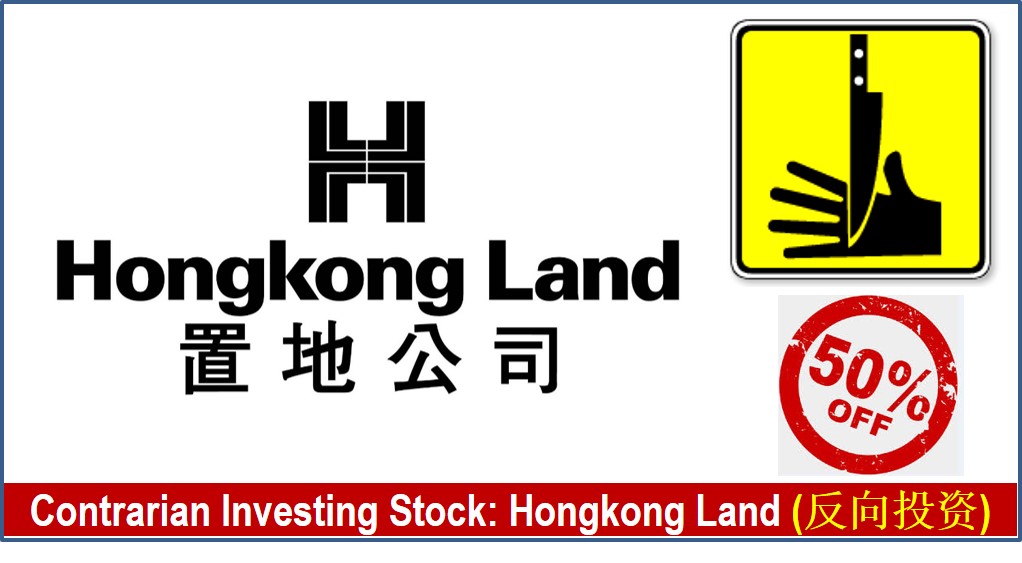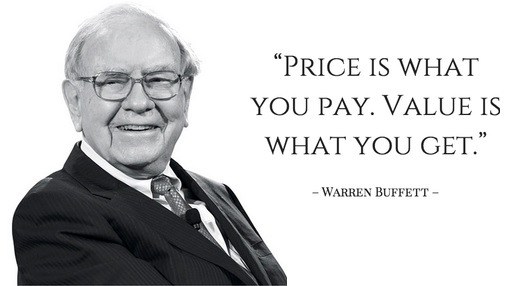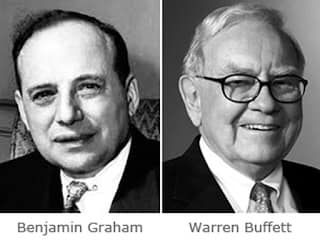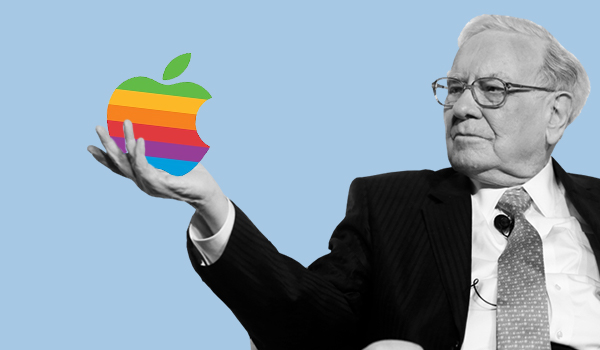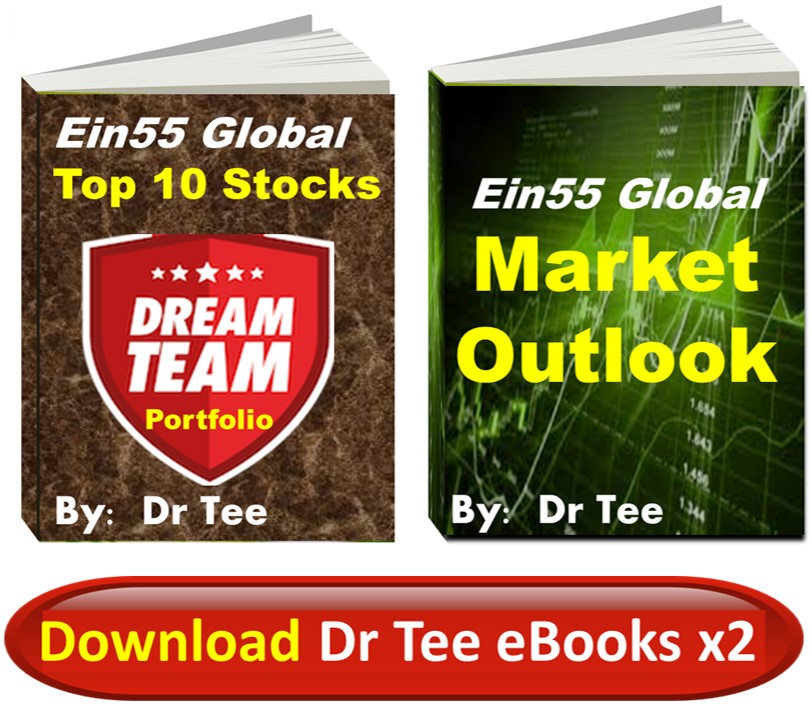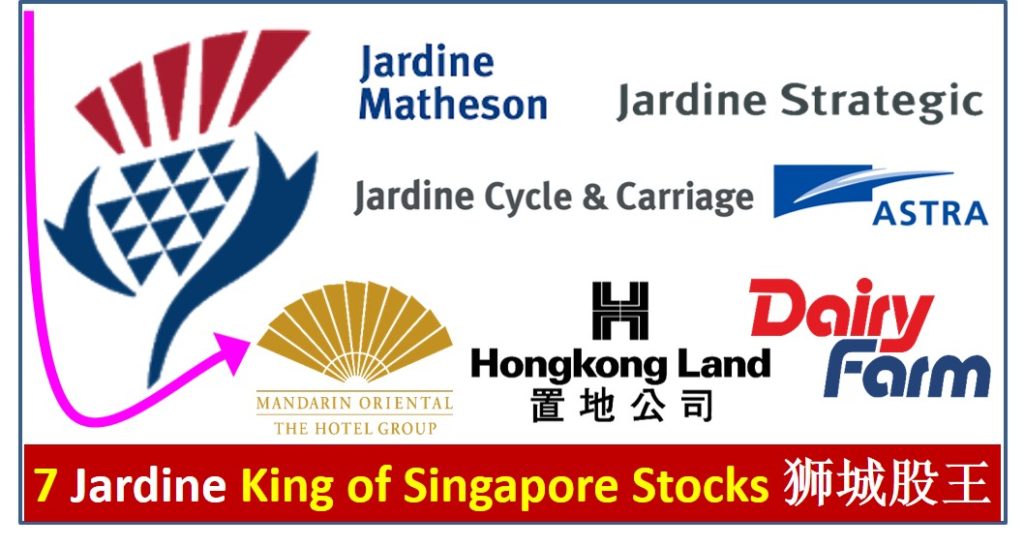
Jardine Group is not just a company, it is a giant group with nearly 200 years of business history (started in 1832, then controlled by Keswick family for many generations till now). Jardine group of companies cover many industries, eg. engineering, automotive, properties, hotel, supermarkets, etc.
Jardine group has 7 giant stocks (Jardine Matheson, Jardine Strategic, Jardine Cycle & Carriage, Astra, Hongkong Land, Dairy Farm, Mandarin Oriental Hotel), all are falling to very low optimism (mostly with optimism <10%) over the past 2 months of global stock crisis. Since 5 of Jardine giant stocks (except Mandarin Oriental Hotel and Astra International – listed in Indonesia) are 30 STI component stocks (contributing to about 15% weightage), it has the strongest influence to Singapore stock exchange, more than individual stock of 3 major banks (DBS, OCBC, UOB) and Singtel.
There are 30 STI index component stocks including 5 Jardine stocks (investor has to focus only on giant stocks for investing):
DBS Bank (SGX: D05), Singtel (SGX: Z74), OCBC Bank (SGX: O39), UOB Bank (SGX: U11), Wilmar International (SGX: F34), Jardine Matheson Holdings JMH (SGX: J36), Jardine Strategic Holdings JSH (SGX: J37), Thai Beverage (SGX: Y92), CapitaLand (SGX: C31), Ascendas Reit (SGX: A17U), Singapore Airlines (SGX: C6L), ST Engineering (SGX: S63), Keppel Corp (SGX: BN4), Singapore Exchange (SGX: S68), Hongkong Land (SGX: H78), Genting Singapore (SGX: G13), Mapletree Logistics Trust (SGX: M44U), Jardine Cycle & Carriage (SGX: C07), Mapletree Industrial Trust (SGX: ME8U), City Development (SGX: C09), CapitaLand Mall Trust (SGX: C38U), CapitaLand Commercial Trust (SGX: C61U), Mapletree Commercial Trust (SGX: N2IU), Dairy Farm International (SGX: D01), UOL (SGX: U14), Venture Corporation (SGX: V03), YZJ Shipbldg SGD (SGX: BS6), Sembcorp Industries (SGX: U96), SATS (SGX: S58), ComfortDelGro (SGX: C52).
6 Jardine stocks listed in Singapore Stock Exchange are secondary listing (primary listing in London Stock Exchange) and traded in USD (currently at high optimism vs SGD). USD usually performs better in bear market (safe haven), weaker during bull market, the longer term forex disadvantage of USD/SGD (about -2%/year USD depreciation) could be compensated by higher growth of 10+%/year of Jardine stock prices.
So, let’s learn to position in 7 Jardine stocks, all are giant stocks based on Dr Tee criteria but each Jardine stock has different characteristic, which may be considered for different personality of investors.
1) Jardine Matheson Holding – JMH (SGX: J36)
2) Jardine Strategic Holding – JSH (SGX: J37)
Jardine Matheson Holding, JMH is “King” of Singapore stocks (狮城股王), the highest share price in Singapore stock market history. JMH share price was peak around US$70/share a few months ago, before falling by 30% during Coronavirus crisis to about US$50/share. It is costly to invest even with minimum of 100 shares per lot (price in USD) = $50 x 1.43 (USD/SGD) x 100 = S$7150.
Highest stock price may not be always a giant stock, although most of the time, high stock prices are giant stocks, higher prices due to growing business over the decades. For example, world’s most expensive stock, Berkshire Hathaway (NYSE: BRK) managed by Warren Buffett, 1 share alone could be US$344,000 (nearly S$500k, could buy a 5-room HDB flat), currently selling at discount of US$290,000 (for details of Berkshire stock, refer to free eBook by Dr Tee on global Top 10 stocks).
The former Singapore stock king was Creative Technology (SGX: C76) with over S$60/share peak stock price recorded in year 2000 dotcom bubble. After the burst of technology bubble, not only stock price in crisis, Creative Technology also lost the giant stock title, company is no longer growing, share prices declining for 20 years till as low as $1/share. Therefore, long term investing requires monitoring of business fundamental, otherwise buy low may get lower over time, suffering huge capital loss. A common mistake for beginner in stock investing is usually buy a famous brand of stock at historical low price or 5-10 years low, assuming the price may recover in future which may not because future business is the key.
Similarly, during Coronavirus crisis, some sectors are badly affected (eg, airlines, F&B, hotel, etc), an investor needs to review whether the business with losses (more than 90% drop in revenue) could last with cash or net asset available. After the crisis is over, could the business recover quickly?
Jardine Strategic Holding, JSH is sibling of JMH, both are owning each other, a special cross-holding structure which could prevent hostile takeover. See another article of this topic: https://www.ein55.com/2017/03/jardine-group-uob-group-cross-holding-stock-network/
Both JMH and JSH stock performance are very close in longer term (eg over 10 years). Investing in either JMH or JSH is as if investing in Jardine fund of stocks with most the Jardine businesses. JMH has average of 1% higher dividend yield than JSH but JSH has average of about 1% higher yearly growth in share price than JMH, so effect is about the same. More details of JMH in earlier article: https://www.ein55.com/2016/04/choose-stocks-grow-30-times-price/
Both JMH and JSH are considered cyclic growth stocks, need to position with
optimism less than 25%, best during global stock crisis or global financial
crisis. Due to cyclic nature of these 2 stocks with minimal dividend for
protection, it is more suitable for investing during recovery phase of stock
crisis, avoid buying low get lower. When positioned right at significant low
optimism in a severe global stock crisis, JMH and/or JSH may be considered for
longer term holding due to high growth but need to monitor its cyclic businesses
to certify that they are giant stocks (based on Dr Tee criteria) as this title
of giant stock is not forever, eg. Creative Technology lost this title about 20
years ago.
“Buy Low” could only have chance to “Sell High” in longer term with condition
that it is a giant stock. If not, “Buy Low” may become “Lower” in prices.
3) Jardine Cycle & Carriage – JCC (SGX: C07)
4) Astra International (IDX: ASii)
Jardine Cycle & Carriage, JCC is only a subsidiary of JSH but itself is already a giant automotive stock (familiar car brands: Mercedes-Benz, Toyota, Honda and Kia). JCC also owns Indonesian automotive giant stock, Astra International (listed in Indonesia Stock Exchange).
JMH owns JSH, JSH owns JCC, JCC owns Astra. So, it is as if 4 levels of stock connection but stock performances are close. JMH and JSH could be considered together (either one). Similarly, JCC and Astra may be considered together through JCC (if easier to invest in Singapore stock than Indonesian stock, Astra).
JCC is a dividend growth giant stock (not for Astra), suitable for investing during low optimism stock market, protected by nearly 6% dividend yield (assuming car business drops during crisis, 50% cut in dividend still has about 3% dividend yield left, more than 1% bank interest rate for cash). When crisis is over, likely the growing business will justify for normal distribution of dividend. However, since it is not a REIT (by law needs to distribute 90% taxable income to shareholders as dividend), the company has the right to choose not to give dividend. Over the past 10 years, JCC has record of giving around 3% dividend yield, current high dividend yield of nearly 6% is mainly due to price dropped by about 50% over the past few months of global stock crisis, therefore dividend yield is doubled from 3 to 6%.
If one believes the Coronavirus crisis or any future crisis are unlikely to stop people from buying cars more than 1 year (eg. could not get out of home for 1 year to view the cars in showroom), then crisis in JCC stock prices could be an opportunity. However, for Q1-Q2/2020 with less shoppers due to global lockdown, there could be temporary drop in business which may be justified by 50% discount in share price.
5) Hongkong Land (SGX: H78)
Hongkong Land is a well-known property stock, owning grade-A commercial properties in both Hong Kong central and Singapore marina area. There are quite a few past articles by Dr Tee on Hongkong Land (https://www.ein55.com/tag/hongkong-land/), mainly an undervalue property stock. However, over the past few years, buy low may get lower as Hongkong Land is not only following Jardine group, also affected by Level 2 property sector (Hong Kong / Singapore) and Level 3 stock property, as well as political economy (eg. over 100 days of Hong Kong protesters last year before Coronavirus crisis).
Among all the 7 Jardine giant stocks, Hongkong Land is the “safest” due to property asset selling at over 70% discount (price to book ratio, PB, is less than 0.3). The high dividend yield of 5% (eg from property rental) is a bonus for long term investor of Hongkong Land, providing passive income (even if 5% dividend yield is cut by half for next 12 months, still suitable as defender), no issue even if “crisis” of any form (protester, virus, etc) may last more than 5 years. During Coronavirus crisis, tenants of property could lose money due to less shoppers but landlord (Hongkong Land) still could collect stable rental.
Mid-term risk of Hongkong Land could be high property valuation in Hong Kong may not be sustainable if the average 20 years property cycle of Hong Kong falls from high optimism. So far Coronavirus only affects global stock markets and badly affect business of certain sectors, but not yet on property sector. Even so, long term outlook for Hong Kong and Singapore property sectors are steady gradual growth as a country surrounded by sea with limited land but nearly unlimited future population (both has the top 10 highest population density in the world with growing economy for decades) would support the growing property prices in decades to come.
In short, investing in Hongkong Land stock is an investment in Singapore and Hong Kong countries through as integrated stock and property markets.
6) Mandarin Oriental Hotel (SGX: M04)
Mandarin Oriental Hotel is not only a hotel in Singapore, it has many hotels globally. During Coronavirus crisis, hotel (hospitality sector) is badly affected. So, investor needs to monitor Q1 and Q2/2020 results of Mandarin Oriental Hotel before making decision.
Mandarin Oriental Hotel is a marginal giant stock, the weakest among 7 Jardine stocks. Even before Coronavirus crisis, business fundamental has been declining. Despite 60% discount in hotel asset with PB of 0.4, Mandarin Oriental Hotel is not as valuable as Hongkong Land.
For short term or mid-term cyclic trading strategy, this stock may be considered if there is a strong reversal in price trend, especially when Coronavirus condition may improve but risk is relatively higher than other 6 Jardine stocks.
7) Dairy Farm International (SGX: D01)
Dairy Farm is famous of its supermarket and consumer business (Wellcome, Cold Storage, Seven Eleven, IDEA, etc) in Hong Kong, Singapore and regional countries. During Coronavirus period, supermarket business should perform better (see how crowded when lockdown was announced) as is a consumer staples business, people still need to eat and drink, if they could not go out from home.
However, before Coronavirus crisis, Dairy Farm only has average business performance. It even sells some its seven eleven stores. It has stable dividend payment record, about 4% yield currently, possible to position as midfielder role. Competitor supermarket stock, Sheng Siong (SGX: OV8) performs better than Dairy Farm for business and stock prices. Sheng Siong has recovered the “losses” in stock prices as business is doing too good during Coronavirus period. Sheng Siong is only a young giant stock but does well in the current global stock crisis, having potential to be a true giant stock in future with more proven record.
Therefore, not all sectors are affected by the same crisis. Investor may explore stocks with stable businesses, leveraging on market fear to ask for over 20% discount in those growth stocks. Crisis is Opportunity when stock prices fall due to fear but business is still strong. Crisis is crisis when stock prices fall mainly due to weaker business.
===============================
In summary, all 7 Jardine stocks are giant stocks at low optimism. However, the stock prices have been bearish for a few years, undervalue asset becomes more undervalue each year. Therefore, these Jardine stocks may not possible for traders without strong holding power as buy low may get lower in short term to medium term, unless there is a clear reversal in stock prices to uptrend again.
For long term investors who apply undervalue investing may consider Hongkong Land and Jardine Cycle & carriage stocks which pay over 5% dividend yield (but assume this amount may be cut by 50%). For very conservative investor, Hongkong Land with over 70% discount in asset value (PB < 0.3) is another strong consideration, even if Hongkong Land could not survive the unlikely Great Depression (<5% chance it may happen), investors may not lose the capital due to high safety of margin.
Strategies for investing in Jardine group is similar as other giant stocks at low optimism, multiple entries, eg 1, 3 or 5 “bullets” of capital, first entry at low optimism < 25%, subsequently optional entries could be either downtrend (5-10% lower, average down for investing) counter-trend investing or uptrend (5-10% higher, average high for trading) follow-trend trading if optimism is still less than 25%. It is fine if only 1 “bullet” (1 entry) is triggered (eg. stock market has V-shape recovery), future may follow short term or mid term trading for actions, to be reviewed again.
Sharing above for 7 Jardine stocks are for educational purpose (almost spend 1 day of Dr Tee valuable time writing this long article, hope it is an useful reference for readers). Please make your own decision with independent thinking. If you could read until this sentence, implying you have the determination to learn and apply stock investing.
==================================
Drop by Dr Tee free 4hr investment course to learn how to position in global giant stocks of growing sectors with 3 value investing strategies (undervalue, growth, dividend stocks), knowing What to Buy, When to Buy/Sell.
Learn further from Dr Tee valuable 7hr Online Course, both English (How to Discover Giant Stocks) and Chinese (价值投资法: 探测强巨股) options, specially for learners who prefer to master stock investment strategies of over 100 global giant stocks at the comfort of home.
You are invited to join Dr Tee private investment forum (educational platform, no commercial is allowed) to learn more investment knowledge, interacting with over 9000 member.

